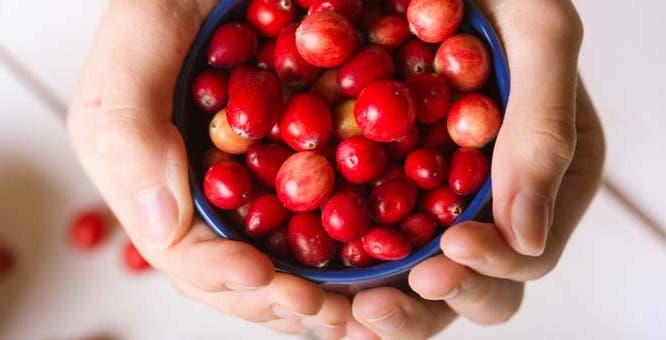Cranberries help prevent diabetes and cardiovascular diseases, study finds
Cranberry extracts appear to positively influence gut microbiota composition, potentially aiding in the prevention of chronic diseases.

Cranberry extracts appear to positively influence gut microbiota composition, potentially aiding in the prevention of chronic diseases. (CREDIT: Creative Commons)
Cranberries, a popular fruit rich in antioxidants, have long been touted for their health benefits. Now, a new study by researchers at Université Laval and the Institute of Nutrition and Functional Foods (INAF) sheds light on a potential mechanism: cranberry extracts appear to positively influence gut microbiota composition, potentially aiding in the prevention of chronic diseases.
The study, led by Professor Yves Desjardins, investigated the impact of cranberry polyphenols and oligosaccharides on gut bacteria. These bioactive compounds are found in high concentrations within cranberries and are believed to contribute to the fruit's health properties.
Boosting Beneficial Bacteria
The research team observed a significant increase in the abundance of Bifidobacterium within the gut microbiota of participants who consumed cranberry extract for just four days. Bifidobacterium is a genus of bacteria associated with a reduced risk of developing diabetes and other cardiometabolic diseases.
"Traditionally, these beneficial bacteria are stimulated by consuming dietary fiber," explains Jacob Lessard-Lord, a postdoctoral fellow at INAF. "Remarkably, we observed the same effect with a much lower dose of cranberry extract – nearly 20 times less." This finding suggests that cranberry extracts may offer a concentrated and efficient way to promote the growth of Bifidobacterium.
Strengthening the Gut Barrier
The study also revealed a positive impact on Akkermansia muciniphila, another key gut bacterium. Akkermansia muciniphila plays a crucial role in maintaining intestinal health by reducing inflammation and strengthening the gut barrier.
A weakened gut barrier allows harmful bacterial products, like lipopolysaccharides (LPS), to leak into the bloodstream. This phenomenon, known as metabolic endotoxemia, is linked to the development and progression of chronic inflammatory and metabolic diseases.
Related Stories
Professor Desjardins emphasizes the significance of this finding: "A Western diet, high in processed foods and low in fiber, can disrupt the gut microbiota, leading to inflammation and compromised gut barrier integrity. This allows LPS to enter the bloodstream, contributing to chronic disease risk."
By promoting the growth of Bifidobacterium and Akkermansia muciniphila, cranberry extracts may offer a novel strategy for preventing chronic diseases. These beneficial bacteria create an anti-inflammatory environment within the gut. They also strengthen the connections between intestinal barrier cells, ultimately fortifying the barrier against harmful substances.
The research involved approximately 40 participants who consumed a cranberry extract supplement in capsule form for four days. The dosage mimicked the amount of bioactive compounds found in 60 grams of fresh cranberries. Blood, urine, and stool samples were collected from participants before and after the intervention period.
Daily dose of (poly)phenols and oligosaccharides provided by the cranberry extract. Proportion of each (poly)phenols class of the total (poly)phenolic content. (CREDIT: npj Biofilms & Microbiomes)
Prior to the human trial, the researchers conducted successful experiments using the SHIME in vitro system, which mimics the human intestinal environment. These initial findings provided a strong rationale for further investigation in human subjects.
Long-Term Effects and Personalized Approaches
The research team is currently exploring the long-term effects of cranberry extract consumption on gut health and chronic disease risk. "The positive impact observed after just four days is very encouraging," says Lessard-Lord.
Daily dose of (poly)phenols and oligosaccharides provided by the cranberry extract. Proportion of each (poly)phenols class of the total (poly)phenolic content (b) and of each monosaccharide of the total complex carbohydrates content (c). (CREDIT: npj Biofilms & Microbiomes)
Interestingly, the study also revealed individual variability in participants' responses to the cranberry extract. Future research will focus on identifying specific gut microbiota profiles that respond most favorably to the intervention. This personalized approach could lead to the development of targeted therapies based on individual needs.
Collaboration and Commercialization
This research was conducted as part of the NSERC-Symrise Industrial Research Chair on the prebiotic effect of fruit and vegetable polyphenols (PhenoBio+). Symrise, a leading flavor and fragrance company, has already launched a product called Prebiocran based on the team's findings.
Prebiocran, approved for use in Europe, highlights the potential for translating these research findings into commercially available products that promote gut health.
The study, published in the scientific journal npj Biofilms & Microbiomes, was co-authored by Jacob Lessard-Lord, Charlène Roussel, Joseph Lupien-Meilleur, Pamela Généreux, Véronique Richard, Valérie Guay, Denis Roy, and Yves Desjardins.
Their work contributes significantly to the growing body of evidence on the potential of dietary interventions, particularly those rich in bioactive compounds like cranberry extracts, to modulate gut microbiota and promote overall health.
Other dietary and health benefits of eating cranberries
Cranberries are well-known for their numerous health benefits, particularly due to their high antioxidant content and unique phytochemicals. Here are a few positive medical or health benefits of eating cranberries, supported by research:
Urinary Tract Health: Cranberries contain proanthocyanidins, which may help prevent urinary tract infections (UTIs) by preventing bacteria like E. coli from adhering to the urinary tract walls. Studies have shown that consuming cranberry products can reduce the recurrence of UTIs, especially in women. Source: "Cranberries and Urinary Tract Infections: How Can the Same Evidence Lead to Conflicting Advice?"
Heart Health: The antioxidants present in cranberries, such as flavonoids and polyphenols, may contribute to heart health by reducing inflammation and improving cholesterol levels. Regular consumption of cranberry juice has been associated with a reduced risk of cardiovascular disease. Source: "Cranberries and Cardiovascular Health: An Overview"
Antioxidant Properties: Cranberries are rich in antioxidants, particularly vitamin C and various phytochemicals, which help neutralize free radicals in the body and reduce oxidative stress. This antioxidant activity may contribute to overall health and disease prevention. Source: "Cranberries: Nutritional Components, Health Benefits, and Antioxidant Properties"
Gut Health: The polyphenols found in cranberries may have prebiotic effects, promoting the growth of beneficial bacteria in the gut. This can contribute to improved digestive health and may have implications for overall well-being. Source: "Cranberry Polyphenols: Potential Benefits for Cardiovascular Health"
Cancer Prevention: Some research suggests that the phytochemicals in cranberries, particularly flavonoids and ellagic acid, may have anti-cancer properties by inhibiting the growth of cancer cells and reducing inflammation. However, more studies are needed to confirm these effects definitively. Source: "Cranberries and Their Bioactive Constituents in Human Health"
Incorporating cranberries into your diet, whether through whole berries, juice, or supplements, can be a delicious and nutritious way to support overall health.
For more science and technology stories check out our New Discoveries section at The Brighter Side of News.
Note: Materials provided above by University of Exeter. Content may be edited for style and length.
Like these kind of feel good stories? Get the Brighter Side of News' newsletter.
Joseph Shavit
Head Science News Writer | Communicating Innovation & Discovery
Based in Los Angeles, Joseph Shavit is an accomplished science journalist, head science news writer and co-founder at The Brighter Side of News, where he translates cutting-edge discoveries into compelling stories for a broad audience. With a strong background spanning science, business, product management, media leadership, and entrepreneurship, Joseph brings a unique perspective to science communication. His expertise allows him to uncover the intersection of technological advancements and market potential, shedding light on how groundbreaking research evolves into transformative products and industries.



